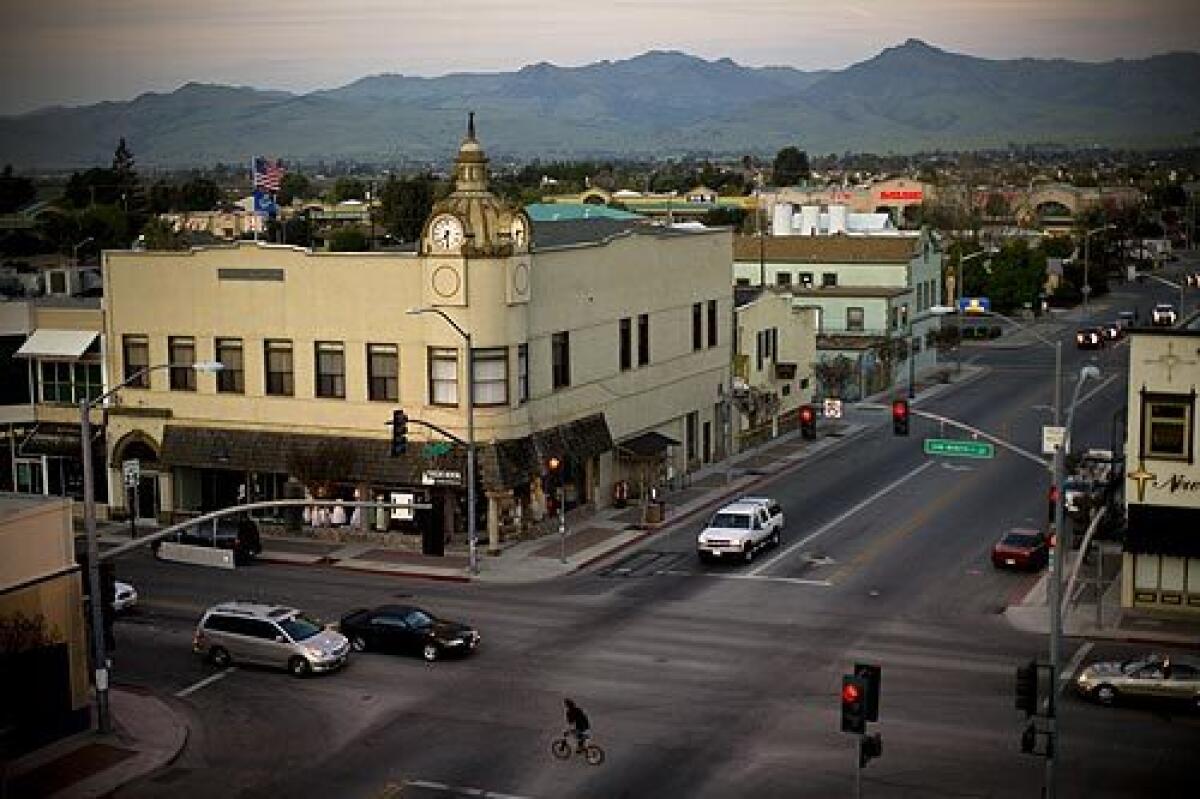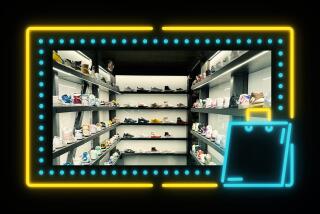Hollister, Calif., is at odds with Abercrombie over name

- Share via
Reporting from Hollister, Calif. — In the lush farmlands east of Monterey Bay, the day opens with the sound of big-rig trucks hauling lettuce, apricots and other produce through this quiet agricultural town of about 36,000 people.
At Jerry’s coffee shop, locals exchange gossip over scrambled eggs while the crew at the downtown fire station washes the red engine and ladder truck.
Welcome to the original Hollister, Calif., incorporated in 1872, birthplace of American biker culture and inspiration for the 1953 film “The Wild One,” starring Marlon Brando.
It’s nothing like the mythical Hollister known to teenagers -- an idyllic Southern California beach town that is portrayed in more than 500 clothing stores across the country, Canada and the United Kingdom.
That’s a myth created and cultivated by Abercrombie & Fitch, the Ohio clothing giant that started the hugely popular Hollister Co. surf-wear line in 2000. The colorful T-shirts, cotton hoodies and faded jeans extolling the Hollister name have made it one of the most recognized brands among teens.
But the popularity seems to stop at the Hollister city limits, where residents say Abercrombie & Fitch has hijacked the town’s name and threatened to sue merchants who sell clothes displaying it. Even worse, the company has refused to open an outlet that could help boost the slumping local economy.
The clash shines a light on the value of a successful brand name in the business world and on the way businesses spend millions of dollars protecting their investments.
But a handful of merchants are ignoring the retail giant’s threat by producing locally made clothes adorned with the name Hollister. And Abercrombie & Fitch attorneys promise to ferret out those who violate their trademark.
“If they try, they would get a call and much more,” said David Cupps, general counsel for Abercrombie & Fitch.
The town, about 300 miles north of Los Angeles, was named for Col. William Wells Hollister, who led one of the country’s largest transcontinental sheep drives from Ohio to California’s fertile San Benito Valley.
Today, the seat of San Benito County is a bucolic community ringed by fields of lettuce, tomatoes, Blenheim apricots and other produce.
The town first broke into American popular culture in 1947 when a skirmish broke out during a Fourth of July motorcycle rally. The scuffle inspired the film that launched Brando to stardom, spawned movies like “Rebel Without a Cause” and “Easy Rider,” and gave birth to biker culture.
Each year since then, Hollister has hosted a massive motorcycle rally in July. But, like the rest of the nation, the town has fallen on hard times. Several empty storefronts haunt the town’s main drag, San Benito Street. City leaders canceled the rally this summer because of the high cost of policing the crowds.
The controversy over the name heated up in 2006 when Stacey Crummett, chief executive of Hollister-based Rag City Blues, added the word “Hollister” to the label of her vintage bluejeans. In response to her trademark application, Abercrombie & Fitch attorneys sent her a letter alleging she was violating the company’s trademark and threatening to sue.
Crummett, who runs the business with her husband, said she added the name simply to identify the location of her headquarters. But she backed down and removed the name from the labels.
“They are a lot bigger than us,” she said. “I said, ‘Let’s just not argue.’ ”
Once word spread about Crummett’s run-in with Abercrombie & Fitch, locals and city officials began to fume, saying that the clothing firm was preventing them from showing their hometown pride on T-shirts and jackets.
“To me, it’s a bunch of baloney,” said Raul Gonzalez, 70, working at his one-room barbershop on 6th Street. “We were here long before they thought of [the apparel line].”
Even students at Hollister’s San Benito High School wonder if they are violating Abercrombie & Fitch’s trademark by wearing shirts emblazed with the school nickname, the Hollister Haybalers.
Like the town, Abercrombie & Fitch has suffered under the recent economic meltdown. Sales throughout the company plummeted 34% in March after falling 30% year-over-year in February.
The retail firm operates 352 Abercrombie & Fitch stores, 210 Abercrombie stores, 507 Hollister Co. stores, 28 Ruehl No. 925 stores and 14 Gilly Hicks stores in the U.S., 10 stores in Canada and four in the United Kingdom. Work is under way on Hollister’s first flagship store, a large, tourist-destination shop scheduled to open in New York’s SoHo neighborhood this spring.
Despite rumors that the clothing line was named for the town or a popular surf spot near Santa Barbara, Cupps said Abercrombie & Fitch pulled the Hollister name out of thin air and then created a storyline to project a Southern California beach vibe to go with the surf-wear line.
To protect the Hollister corporate name, attorneys have filed a slate of trademark applications over the last nine years for use of various forms of the term “Hollister” on belts, blouses, jackets, hats, shoes, deodorant, breath mints, jewelry, lip balm and bags, among other items.
It’s no surprise that Abercrombie & Fitch would be so adamant about defending the trademark name.
Once a company creates a name that invokes an emotion or a sense of familiarity with the public, the name becomes an asset, sometimes more valuable than a company’s buildings, machinery or equipment, said Rob Wallace, managing partner with Wallace Church Inc., a brand identity consultant based in New York.
And, he added, companies that create such iconic names -- such as Coke, Disney or Nike -- are vigilant against any threat to that valuable asset.
“From a legal standpoint, if you allow it to happen you are diluting the sense of brand,” he said.
Still, Hollister City Atty. Stephanie Atigh insists that Abercrombie & Fitch cannot sue if locals are simply putting the town name on clothes to identify the geographic location.
“There is no way you can trademark Hollister, Calif.,” she said. “It’s a geographical place.”
Mark Lemley, a law professor at Stanford University who specializes in intellectual property rights, agrees.
“If all you are doing is identifying your city’s name on your shirt, you are not engaged in trademark use,” he said.
Trademark law is a complex field, and such disputes are typically settled in civil court. Neither the city of Hollister nor the local merchants want to go head-to-head with Abercrombie & Fitch.
“Nobody wants to wrestle the 300-pound gorilla,” said Mark Paxton, publisher of the Pinnacle, one of two weekly newspapers in town.
But a few local merchants are ignoring the threats and selling T-shirts and other tourist fare emblazoned with the town’s name.
“Who’s to say I can’t put the name of my town and my business on a shirt?” complained Chris Cason, manager of Hollister Motorsports, a motorcycle, ATV and accessories shop that sells several T-shirts bearing the name.
Adding to the anger, Abercrombie & Fitch even rejected a recent request by local business leaders to open a “Hollister Co.” outlet downtown. After all, tourists regularly roll into town looking for the surf-wear store, assuming the clothes are made in Hollister.
But according to local merchants, Abercrombie & Fitch dismissed the idea, saying the town’s low- and middle-income demographics wouldn’t support an outlet. The nearest Hollister Co. store is in Salinas, about 30 miles away.
Hollister Mayor Eugenia Sanchez sees a positive side to the dispute: The clothing line may spark greater interest in her hometown.
“If anything, it’s creating more awareness about Hollister.”
More to Read
Inside the business of entertainment
The Wide Shot brings you news, analysis and insights on everything from streaming wars to production — and what it all means for the future.
You may occasionally receive promotional content from the Los Angeles Times.










